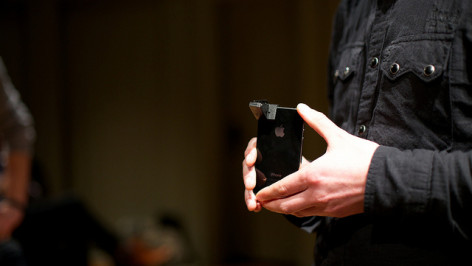

iSpex device on a smartphone. Image by Sebastiaan ter Burg , published under licence CC BY 2.0
Behind iSpex stands a consortium of the Netherlands Research School for Astronomy at University of Leiden, Netherlands Institute for Space Research (SRON), National Institute for Public Health and the Environment (RIVM), and the Royal Netherlands Meteorological Institute (KNMI).
Over the course of summer and autumn 2013, thousands of people in the Netherlands participated in “national iSpex days”, jointly measuring particulate dust. The first results of this awesome social effort are published, and we can hope this project will find epigones in other countries.
iSpex website:
Measuring aerosols with spectropolarimetry
